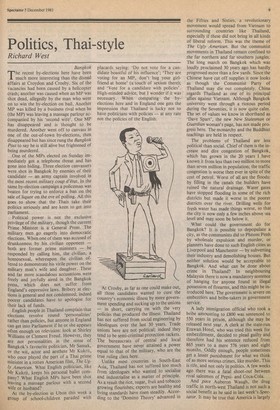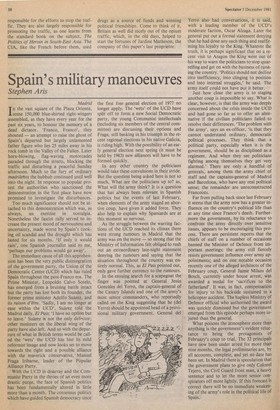Politics, Thai-style
Richard West Bangkok The recent by-elections here have been much more interesting than the dismal affairs at Croydon and Crosby. Six of the vacancies had been caused by a helicopter crash; another was caused when an MP was shot dead, allegedly by the man who went on to win the by-election on bail. Another MP was killed by a business rival when he (the MP) was leaving a massage parlour accompanied by his 'second wife'. One MP has disappeared and is thought to be murdered. Another went off to canvass in one of the out-of-town by-elections, then disappeared but has since rung the Bangkok Post to say he is still alive but frightened of being murdered.
One of the MPs elected on Sunday im mediately got a telephone threat and has gone into hiding. Three election canvassers were shot in Bangkok by enemies of their candidate — an army captain involved in the most recent military coup d'etat. In the same by-election campaign a policeman was beaten for trying to enforce a ban on the sale of liquor on the eve of polling. All this goes to show that the Thais take their politics seriously and are keen to get into parliament.
Political power is not the exclusive privilege of the military, though the current Prime Minister is a General Prem. The military men go eagerly into democratic elections. When one of them was accused of drunkenness by his civilian opponent — both are former prime ministers — he responded by calling him, the civilian, a homosexual, whereupon the civilian offered to demonstrate his virile power on the military man's wife and daughter. These and far more scandalous accusations were freely and joyfully aired in the Bangkok press, which does not suffer from England's oppressive laws. Bribery at elections is general and not condemned; indeed poorer candidates have to apologise for their lack of funds.
English people in Thailand complain that elections revolve round 'personalities' rather than policies, but anyone in England can get into Parliament if he or she appears often enough on television: look at Shirley Williams or Clement Freud. However, they are not personalities in the sense of Bangkok's favourite politician, Mr Samak, or the wit, actor and aesthete Mr Kukrit, Who once played the part of a Thai prime Minister in a rotten American film, The Ugly American. What English politician, like Mr Kukrit, keeps his personal ballet company? What English MPs have been shot leaving a massage parlour with a second Wife or husband?
At the by-election in Ubon this week a group of school-children paraded with placards saying: 'Do not vote for a candidate boastful of his influence'; 'They are voting for an MP, don't hug your girlfriend at home' (a touch of sexism there); and 'Vote for a candidate with policies'. High-minded advice, but I wonder if it was necessary. When comparing the byelections here and in England one gets the impression that Thailand is lucky not to have politicians with policies — at any rate not the policies of the English.
At Crosby, as far as one could make out, all three candidates wanted to cure the country's economic illness by more government spending and sucking up to the unions — in short, carrying on with the very policies that produced the illness. Thailand has not suffered from social engineering by ideologues over the last 30 years. Trade unions here are not political; indeed they tend to be semi-criminal protection rackets. The bureaucrats of central and local government have never attained a power equal to that of the military, who are the true ruling class here. Unlike most countries in South-East Asia, Thailand has not suffered too much from ideologues who wanted to socialise and industrialise as a matter of principle. As a result the rice, sugar, fruit and tobacco growing flourishes; exports are healthy and living standards have risen steadily. According to the 'Domino Theory' advanced in the Fifties and Sixties, a revolutionary movement would spread from Vietnam to surrounding countries like Thailand, especially if these did not bring in all kinds of liberal reform. This was the theme of The Ugly American. But the communist movements in Thailand remain confined to the far northern and far southern jungles.
The long march on Bangkok which was loudly proclaimed 30 years ago has hardly progressed more than a few yards. Since the Chinese have cut off supplies it now looks as though the Communist Party of Thailand may die out completely. China regards Thailand as one of its principal allies against Vietnam. Although Bangkok university went through a riotous period during the Seventies, it is now quite calm. The set of values we know in shorthand as 'Dave Spart', the new New Statesman or Guardian woman's page, has not made progress here. The monarchy and the Buddhist teachings are held in respect.
The problems of Thailand are less political than social. Chief of them is the increase and dire congestion of Bangkok, which has grown in the 20 years I have known it from less than two million to more than seven million in population; the traffic congestion is worse then ever in spite of the cost of petrol. Worst of all are the floods: by filling in the canals the builders have ruined the natural drainage. Water gates have stopped flooding in some of the rich districts but made it worse in the poorer districts over the river. Drilling wells for fresh water has made things worse, so that the city is now only a few inches above sea level and may soon be below it.
What could the government do for Bangkok? It is possible to depopulate a city, as the communists did to Phnom Penh by wholesale expulsion and murder, or planners have done to such English cities as Liverpool and Manchester — by subverting their industry and demolishing houses. But neither solution would be acceptable to Bangkok. And what can be done about crime in Thailand? In neighbouring Malaysia there is now a mandatory sentence of hanging for anyone found in illegal possession of firearms, and this might be introduced here. The government is severe on embezzlers and bribe-takers in government service.
A lady immigration official who took a bribe amounting to £800 was sentenced to 550 years in prison, although she may be released next year. A clerk at the state-run Erawan Hotel, who was tried this week for embezzlement, decided to plead guilty and therefore had his sentence reduced from 865 years to a mere 576 years and eight months. Oddly enough, people sometimes get a lesser punishment for what we think of as more serious crimes, like murder. This is rife, and not only in politics. A few weeks ago there was a fatal shoot-out between rival salesmen of Pepsiand Coca-Cola. And pace Auberon Waugh, the drug traffic in north-west Thailand is not such a social benefit as he said in last week's Spectator. It may be true that America is largely responsible for the efforts to stop the traffic. They are also largely responsible for promoting the traffic, as one learns from the standard book on the subject, The Politics of Heroin in South-East Asia. The CIA, like the French before them, used drugs as a source of funds and winning political friendships. Come to think of it, Britain as well did nicely out of the opium traffic, which, in the old days, helped to start the fortunes of Jardine Matheson, the company of this paper's last proprietor.











































 Previous page
Previous page